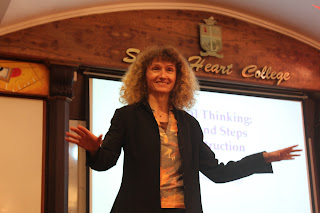A detailed report of the workshop prepared by
Devika Mohanachandran and Rosemary Tom of I Semester MA English
The Department of English organized a one-day workshop on Critical Thinking: Tools and Steps for Instruction at Fr. Melesius Hall on Monday, the 14th of November 2011. The workshop was led by Agnieska Alboszta who has been teaching academic English (all skills) at the American English Institute at the University of Oregon. The event commenced at ten in the morning and extended till 3:30 PM.
Agnieska Alboszta has been an online teacher trainer and curriculum developer for the critical thinking distance education course since 2004. She has made many presentations and has led workshops on the topic of critical thinking development and instruction, in various countries. She, having specialized in critical thinking theory and practice, was able to provide insights on the application and development of critical thinking.
The inaugural function, as convention demands, began with the invocation of blessings of almighty, sung by Devika T S. Prayer was followed by a welcome address by the head of the English department, Prof.John Francis. His speech not only provided a hearty welcome, but laid emphasis on the need for critical thinking in academics. He spoke about how only a teacher who thinks critically can breed critical thinking in his/ her students. The welcome address was succeeded by the presidential address by Fr. Johnson Palakkappillil, the Principal of Sacred Heart College. He spoke about connecting things one reads to one's own life and how to fill the explored arroyos by using the tool of critical thinking. He also mentioned that the seminar happens to be on Children's Day, and referred to the significance of Jawaharlal Nehru as a critical thinker.
Ms. Alboszta had two sessions of talk and interaction. The first session began after a short break for tea, in which she dealt with the theoretical background of critical thinking. She displayed a slide with pictures of familiar faces. The participants were asked to pick one of them, who, according to them, was an ideal critical thinker, and also to state the reason for their choice. There were ebullient responses as the participants came up with their ideas.
She then moved on to the definition, characteristics and stages of critical conception. She also made references to Howard Gardner, Edward De Bono, William Perry and their views on Critical thinking. She concluded the first session bolstering the fact that critical thinking is strenuous as it takes time, effort and perseverance.
Following a heavy lunch in traditional style, the second session began in which Ms.Alboszta spoke about the application of critical thinking. A teacher, according to her, is supposed to be a model of sound thinking as well as ethical behaviour for students. A teacher ,instead of being an omniscient commandant, has to encourage participation in students, maintain a good relationship and also inseminate self-respect in them which in turn will give rise to confidence and thus empowerment. She also threw light on the various productive means of teaching. The second session, which gave immensely useful information about the application of critical thought, left the participants wiser. Ms Alboszta encouraged questions and answered them quite convincingly.
Her light-hearted comments definitely made the sessions more interesting and informal. Prof. Madhu and Mr. George Christopher, in their feedback, reflected on her lecture and stated that it proved to be informative and useful. Prof. Madhu observed that critical thinking is a scientific discipline which can be used as a tool to facilitate learning process. Mr. George Christopher stressed on the importance of rethinking of our thoughts. The event came to a close with the vote of thanks by Prof. C S Francis on behalf of the department of English, followed by the National Anthem.
Photo Credits: Sreejith, IQAC and Shijo P Varghese, Dept. of English
Photo Credits: Sreejith, IQAC and Shijo P Varghese, Dept. of English




No comments:
Post a Comment